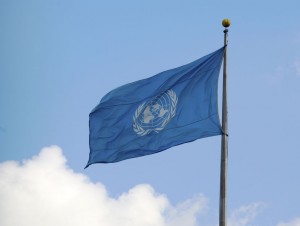UN Update: AHA Submits Testimony in Support of Free Expression at Human Rights Council Meeting in Geneva

The 29th session of the United Nations’ Human Rights Council, an intergovernmental body made up of forty-seven states working to protect human rights around the world, opened in Geneva, Switzerland, on June 15. According to a press release:
Highlights of the three-week session will include a report from United Nations High Commissioner for Human Rights, Zeid Ra’ad Al Hussein. The Council will also address the terrorist attacks and human rights abuses committed by Boko Haram and the human rights situations in Belarus, the Central African Republic and Côte d’Ivoire. The programme includes two panel discussions, on the education of girls and on the effects of terrorism, and a full-day discussion on women’s rights which will focus on preventing domestic violence against women and girls and also women’s participation in decision-making processes.
The American Humanist Association holds non-governmental (NGO) status at the UN. As the AHA’s UN representative, I submitted the following testimony in support of human rights as they affect humanists and nonbelievers.
Ninety-five years ago, Supreme Court Justice Oliver Wendell Holmes wrote a brief that in its time seemed radical but has proven to be the standard by which we view the right to free speech and expression today. Justice Holmes wrote:
Persecution for the expression of opinions seems to me perfectly logical. If you have no doubt of your premises or your power, and want a certain result with all your heart, you naturally express your wishes in law, and sweep away all opposition. To allow opposition by speech seems to indicate that you think the speech impotent, as when a man says that he has squared the circle, or that you do not care wholeheartedly for the result, or that you doubt either your power or your premises.
But when men have realized that time has upset many fighting faiths, they may come to believe even more than they believe the very foundations of their own conduct that the ultimate good desired is better reached by free trade in ideas — that the best test of truth is the power of the thought to get itself accepted in the competition of the market, and that truth is the only ground upon which their wishes safely can be carried out.
So what of the individual destinies and ultimate fate of three brave Bangladeshi men willing to speak their mind knowing full well that their blogging would mark them for harassment and ultimate violence? Their gruesome deaths at the hands of hit squads is the reason why we are here today—to praise their memory and courage.
We have the privilege today to honor men who saw that their ideas, their passion and their willingness to speak their personal truth—to essentially “be the change” as symbolized by Dr. Martin Luther King Jr—was vital to their humanity and that of every living person. These men were writing for themselves but were also giving voice for readers who shared their thoughts and who remain too afraid to speak their minds.
The year 2015 has been a bloody and deadly year for free expression and free speech. In February, Avijit Roy was murdered for writing a blog about his atheism. In March, Washiqur Rahman was similarly executed. And on May 12, Ananta Bijoy Das was also killed for expressing his ideas and nonbelief. Each of these men was brutally hacked to death with knives and machetes.
Reporters without Borders claimed in 2014 that a group calling itself “Defenders of Islam in Bangladesh” had published a “hit list” of eighty-four writers they viewed as insulting or opposing Islam. As of today, nine of those on the list have been killed and many more have been attacked.
The American Humanist Association wishes to bring to the attention of the United Nations, and specifically to the UN Human Rights Commission, the sad fate of these writers and many others like them. I speak of writers and thinkers who are unable to express their views because of governmental blasphemy laws. These writers and thinkers also face daily threats from lawless vigilantly groups who see it as their right, indeed their duty, to suppress in the harshest terms any discourse which they find insulting to their faith.
The American Humanist Association requests that the United Nations work with local law enforcement in Bangladesh to find and bring those responsible for the deaths of these three freethought bloggers to justice.
The American Humanist Association wishes to record that it considers the murders of these three secular humanist bloggers a clear violation of several Articles of the Universal Declaration of Human Rights, including but not limited to:
Article 1: Freedom and Equality by Birthright
Article 2: Rights Bestowed without Distinction
Article 5: To Live Without the Threat of Cruel and Unusual Punishment
Article 18: Freedom of Thought, Conscience and Religion
Article 19: Freedom of Opinion and Expression
Article 20: Freedom of Assembly and Association
Finally, the American Humanist Association wishes that the United Nations, in its good work and efforts to serve and service humanity, actively protect the lives of writers, artists and citizens in all nations who wish to freely express their ideas, thoughts, and opinions irrespective of modality, location, or law.
